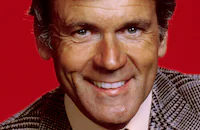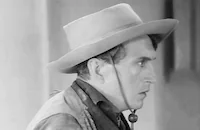Baby the Rain Must Fall

Brief Synopsis
Cast & Crew
Robert Mulligan
Lee Remick
Steve McQueen
Don Murray
Paul Fix
Josephine Hutchinson
Film Details
Technical Specs

Synopsis
Georgette Thomas and her daughter, Margaret Rose, travel by bus to a small Texas town to meet her husband, Henry, when he is released from prison after serving time for stabbing a man during a drunken brawl. Slim, the local sheriff and boyhood friend of Henry, takes Georgette to her husband, a guitar-playing singer still dominated by Miss Kate Dawson, the aging spinster who reared him following the death of his parents. Henry tries to make a home for his wife and daughter, but Miss Kate forbids his singing in local nightclubs, threatening to have him returned to prison if he does not obey her. When Miss Kate finally dies, with a curse for him on her lips, the frustrated Henry drunkenly destroys her possessions and desecrates her grave. Henry is returned to prison, and Georgette and Margaret Rose leave town with Slim.

Director

Robert Mulligan
Cast

Lee Remick

Steve McQueen

Don Murray

Paul Fix

Josephine Hutchinson

Ruth White
Charles Watts
Georgia Simmons

Carol Veazie
Estelle Hemsley
Kimberly Block
Zamah Cunningham
George Dunn
Crew
Roland Anderson
Elmer Bernstein
Elmer Bernstein
Lambert Day
Horton Foote
Isabel M. Halliburton
Vance Johnson
Joseph E. Kenny
Ben Lane
Ernest Laszlo
Robert Mulligan
Alan J. Pakula
Alan J. Pakula
Meta Rebner
Charles J. Rice
Ernie Sheldon
Aaron Stell
Billy Strange
Frank [a.] Tuttle

Videos
Movie Clip



Hosted Intro
Film Details
Technical Specs

Articles
Baby, the Rain Must Fall
In the 1965 movie McQueen plays Henry Thomas, an orphan who was sent to live with an abusive woman that regularly beat him and degraded him. Henry is desperate to get out of the small southern town where he was raised and dreams of becoming a rock star "like Elvis Presley." Unfortunately Henry's dreams are hindered by his minimal talent, explosive temper and a dependency on alcohol. When the film starts Henry has just been released from jail after serving time for stabbing a man in a fight. After his wife Georgette (Lee Remick) and their young daughter Margaret Rose (Kimberly Block) arrive in town they try to form some semblance of a family. At first Henry seems eager to sort out his life and start over again but things quickly begin to deteriorate. His abusive stepmother continues to torment him and Henry's inability to come to terms with his past makes the possibility of a healthy and happy future with his wife and child impossible.
Steve McQueen's own troubled background undoubtedly informed his terrific performance as the damaged would-be rock star Henry Thomas. McQueen's vulnerability and animal-like intensity is perfectly suited for the role of an abused man trying to follow his dreams while railing against a wall of indifference as he longs for some kind of stability in his unhinged life. Robert Mulligan's direction is uneven and some of the creative choices he made throughout the film are questionable. But Steve McQueen still manages to give one of his most personal and interesting performances in the film. There are a handful of moments in Baby the Rain Must Fall that really stand out such as when McQueen's character confronts his cruel stepmother, now an aging invalid living in a crumbling southern mansion. He also shares some tender moments with actress Lee Remick and the young Kimberly Block as the three attempt to turn their small rented house into a real home.
Since McQueen couldn't sing a note the renowned American songwriter and guitarist Billy Strange was brought in to dub McQueen's vocals for the songs heard in the film. Billy Strange was accompanied by the popular country artist Glenn Campbell on guitar and the talented session drummer Hal Blaine. Campbell and Blaine can both be seen performing on stage with Steve McQueen in the movie. Unfortunately McQueen's dubbed scenes in the film come across as awkward and unconvincing. Another noticeable weakness is the clumsily staged and unrealistic fight scenes in the film.
Lee Remick wasn't given a lot to do in the movie but her natural grace and beauty carry her a long way. She's perfectly convincing as the hopeful and caring Georgette. Her bond with the young actress playing her daughter (Kimberly Block) seems genuine and there's a real warmth between them that makes their scenes together very convincing. Robert Mulligan proved that he knew how to direct children during the making of To Kill a Mockingbird and he manages to get an extremely moving and memorable performance from Block in Baby the Rain Must Fall. It's not surprising that a lot of critics focused their attention on her performance when the film was finally released. Bosley Crowther of the New York Times said, "Some of the most affecting business in the film is naturally and freely accomplished by Kimberly Block as the couple's child." Kimberly Block seemed destined for bigger roles but this would be her one and only film.
With the exception of only a few scenes, Baby the Rain Must Fall was shot entirely in Horton Foote's hometown of Wharton, Texas. Foote even helped director Robert Mulligan scout the area for filming locations. The writer took a very personal approach to the screenplay and used his younger brother as inspiration for the character of Henry Thomas. Foote also wanted to accentuate the small-minded pettiness and denial that can occasionally corrupt a small town and turn it against itself. The southern gothic atmosphere in Baby the Rain Must Fall is so thick that you can literally taste the dust coming off the unpaved roads. There's a world-weariness and atmosphere of decay in the movie that is hard to shake off. This is undoubtedly the effect that Foote and Mulligan were going for and the dark mood of the film was helped greatly by Ernest Laszlo's stunning black and white cinematography. Together Robert Mulligan, Horton Foote and Ernest Laszlo managed to perfectly capture the beauty as well as the isolation of a small Texas town.
The movie wasn't well received when it was originally released. Critics and audiences didn't seem to care for the characters or understand what the film was trying to accomplish. By almost all accounts Baby the Rain Must Fall was a critical and commercial failure but the American singer Glenn Yarbrough did have some success with the film's title track originally composed by Elmer Bernstein and lyricist Ernie Sheldon. Yarbrough recorded his own version of the song soon after the movie was released and his single reached #12 on the Billboard Hot 100 in 1965. It remained popular long after the film was forgotten.
Throughout their careers, director Robert Mulligan and his producer Alan J. Pakula took on many complicated social issues in the films they made together. Fear Strikes Out (1957) explored mental illness, To Kill a Mockingbird dealt with racism, Love with the Proper Stranger (1963) deals with the sensitive subject of abortion and Baby the Rain Must Fall attempts to shine a light on the effects of child abuse. Unlike a lot of other "message movies" made during the early '60s, Mulligan and Pakula's films usually didn't offer audiences simple answers to the complex questions they raised. In some ways Baby the Rain Must Fall was trying to tackle a topic that the general public wasn't ready to face in 1965 and is one of many reasons that the movie wasn't well received at the time. Decades later it's somewhat easier to appreciate the film's ambitions; Baby the Rain Must Fall is a fascinating milestone in Steve McQueen's short but impressive career.
Producer: Alan J. Pakula
Director: Robert Mulligan
Screenplay: Horton Foote (screenplay, play "The Travelling Lady")
Cinematography: Ernest Laszlo
Art Direction: Roland Anderson
Music: Elmer Bernstein
Film Editing: Aaron Stell
Cast: Steve McQueen (Henry Thomas), Lee Remick (Georgette Thomas), Don Murray (Slim), Paul Fix (Judge Ewing), Josephine Hutchinson (Mrs. Ewing), Ruth White (Miss Clara), Charles Watts (Mr. Tillman).
BW-100m.
by Kimberly Lindbergs
Sources:
Horton Foote: America's Storyteller by William Hampton
Horton Foote: A Literary Biography by Charles S. Watson
McQueen by Christopher Standford
Steve McQueen: An American Rebel by Marshall Terrill

Baby, the Rain Must Fall
Quotes
Trivia
Notes
Filmed in and around Wharton and Columbus, Texas. Working title: Traveling Lady.

Miscellaneous Notes
Released in United States Winter January 1, 1965
Released in United States Winter January 1, 1965














